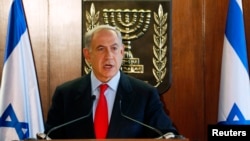JERUSALEM —
Israel has expressed deep skepticism about the possible emerging rapprochement between Iran and the West, following a media blitz by the Islamic Republic’s new president at the United Nations. Iranian President Hassan Rouhani, who won Iranian elections in June, is widely seen as a moderate.
Israeli Prime Minister Benjamin Netanyahu has warned the West not to be deceived by signs of moderation from Iran.
“Israel would welcome a genuine diplomatic solution that truly dismantles Iran’s capacity to develop nuclear weapons. But we will not be fooled by half-measures that merely provide a smokescreen for Iran’s continual pursuit of nuclear weapons. And the world should not be fooled either,” said Netanyahu.
Israel is deeply concerned about the enthusiasm the West has shown toward Iran’s new president, Hassan Rouhani, during his visit to the United Nations.
To demonstrate his displeasure, Netanyahu instructed Israel’s U.N. delegation to boycott Rouhani’s speech and walk out of the General Assembly.
Israel sees Iran’s nuclear program as a threat to its existence. But in his speech, Rouhani said the program is for peaceful purposes.
“Nuclear weapons have no place in Iran’s defense doctrine,” he said, “and contradict its religious and ethical convictions.”
Netanyahu said that amounts to “hypocrisy.”
“Iran thinks that soothing words and token actions will enable it to continue on its path to the bomb. Like North Korea before it, Iran will try to remove sanctions by offering cosmetic concessions, while preserving its ability to rapidly build a nuclear weapon at a time of its choosing,” said Netanyahu.
U.S. President Barack Obama told the General Assembly on Tuesday that he is directing U.S. Secretary of State John Kerry to pursue a diplomatic agreement on Iran's nuclear program. Obama said he firmly believes "the diplomatic path must be tested."
Israel is urging the international community to leave crippling sanctions in place, saying that Iran is using negotiations to buy more time to reach nuclear capability. Israeli leaders have also warned that the time for diplomacy is running out, and that if it fails, Israel might attack Iran’s nuclear facilities on its own.
The foreign ministers of the five permanent Security Council members, including U.S. Secretary of State John Kerry, will meet with their Iranian counterpart later this week to discuss the issue.
Iran will top the agenda when Netanyahu meets Obama at the White House next week. The Israeli leader is scheduled to address the U.N. General Assembly on Tuesday.
Israeli Prime Minister Benjamin Netanyahu has warned the West not to be deceived by signs of moderation from Iran.
“Israel would welcome a genuine diplomatic solution that truly dismantles Iran’s capacity to develop nuclear weapons. But we will not be fooled by half-measures that merely provide a smokescreen for Iran’s continual pursuit of nuclear weapons. And the world should not be fooled either,” said Netanyahu.
Israel is deeply concerned about the enthusiasm the West has shown toward Iran’s new president, Hassan Rouhani, during his visit to the United Nations.
To demonstrate his displeasure, Netanyahu instructed Israel’s U.N. delegation to boycott Rouhani’s speech and walk out of the General Assembly.
Israel sees Iran’s nuclear program as a threat to its existence. But in his speech, Rouhani said the program is for peaceful purposes.
“Nuclear weapons have no place in Iran’s defense doctrine,” he said, “and contradict its religious and ethical convictions.”
Netanyahu said that amounts to “hypocrisy.”
“Iran thinks that soothing words and token actions will enable it to continue on its path to the bomb. Like North Korea before it, Iran will try to remove sanctions by offering cosmetic concessions, while preserving its ability to rapidly build a nuclear weapon at a time of its choosing,” said Netanyahu.
U.S. President Barack Obama told the General Assembly on Tuesday that he is directing U.S. Secretary of State John Kerry to pursue a diplomatic agreement on Iran's nuclear program. Obama said he firmly believes "the diplomatic path must be tested."
Israel is urging the international community to leave crippling sanctions in place, saying that Iran is using negotiations to buy more time to reach nuclear capability. Israeli leaders have also warned that the time for diplomacy is running out, and that if it fails, Israel might attack Iran’s nuclear facilities on its own.
The foreign ministers of the five permanent Security Council members, including U.S. Secretary of State John Kerry, will meet with their Iranian counterpart later this week to discuss the issue.
Iran will top the agenda when Netanyahu meets Obama at the White House next week. The Israeli leader is scheduled to address the U.N. General Assembly on Tuesday.












